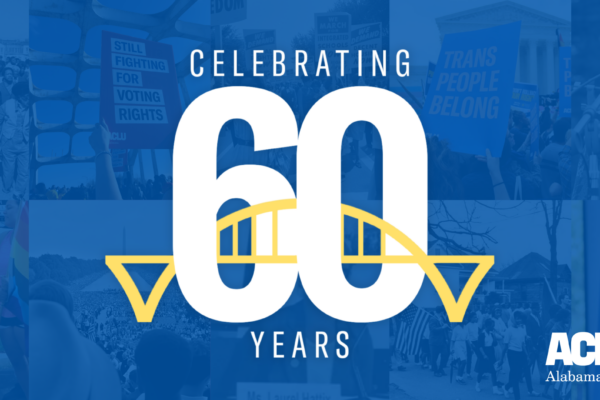As a native of Montgomery, Alabama, my education on the Civil Rights Movement began at an early age. However, the more I learned about this massive movement for civil rights in this state, the more I realized that the city—the state—that I loved had such a complex history, but a story that still seemed incomplete. In preparation for this blog, I spent a lot of time researching the work of our affiliate over the past 60 years, and it was as if the stories I had heard came to life.
While this time in our state and country feels rife with turbulence and confusion, our history has shown that oppression only breeds resilience. Through this work, I have found a renewed hope that we are not alone in this fight. We are surrounded by a great cloud of witnesses and foot soldiers who join us in battle. The fight isn’t over and we’re ready to move this living history into the next 60 years.
The American Civil Liberties Union of Alabama (ACLU of Alabama) was established in 1965 to ensure the fulfillment of promises outlined by the United States Constitution for all Alabamians. In celebration of our 60th year, we are taking a look back at our organization’s history and the remarkable work we’ve done alongside Alabamians in the Courts, in the Statehouse, and in community.
Long before 1965, the ACLU’s presence in Alabama dates to the 1930s when the organization raised money to aid the defense of the Scottsboro Boys. In the 1940s, the ACLU represented striking Alabama coal miners and other labor organizers. The 1950s and 1960s were major battleground years as the organization worked diligently to secure voting rights for Black Alabamians. As the North Star was the key to liberation for those pursuing freedom through the Underground Railroad, the Civil Rights Movement is our north star and the foundation of our work.
In the 1970s, we won the landmark case, Wyatt v Rogers. The ACLU of Alabama filed a lawsuit against the State of Alabama for the condition of mental health facilities and programs in Alabama, which violated the constitutional rights of the residents and participants.
We then turned our attention once more to the state of voting rights for Black Alabamians. The Alabama Voting Rights Project (AVRP) was formally created in 1984 in partnership with several Alabama civic organizations but the groundwork for the coalition began in the late 1970s. The project was created to protect the voting rights of Black Alabamians who, at the time, made up about 26% of the population of the state but had little to no representation in public offices. The hard work and dedication of this coalition led to the election of the first African American Congressman since the Reconstruction era in 1992.
In 1991, the affiliate began representing Alabama children that were receiving inadequate education. The landmark case Harper v. James resulted in the striking down of a 1956 Alabama State Amendment that was designed to destabilize Brown v. Board of Education. The plaintiffs were also able to get a Liability Order that required that all Alabama students receive a fair and equitable education. In the same year, we aided LGBTQIA+ students at Auburn University who were trying to establish a permanent chapter of the Gay and Lesbian Association. After not receiving approval from the university’s Student Government Association (SGA), the ACLU contacted the university administration threatening a lawsuit if these students were not issued a charter. The Auburn Gay and Lesbian Association (AGLA) received its charter in 1992.
The work to continue to protect and defend the rights of students in Alabama continued in 2006 with Lee v. Macon (Pickens County Board of Education). The case was originally filed in 1963. Our immediate goal was to prevent the closure of the Carrolton Unit School, which would have directly impacted the Black students of the Carrolton community. The plaintiffs secured a court order that preserved the school’s K-6 unit and required the Board of Education’s dedication and commitment to ensure the school’s success.
In April 2010, Shelby County, Alabama filed a lawsuit against the United States asserting that sections 4(b) and 5 of the Voting Rights Act of 1965 was unconstitutional. Section 5 protected against voting discrimination in jurisdictions like Shelby County that have a history of voter suppression. The ACLU of Alabama joined the case with the hope of preserving these critical safeguards of democracy. We represented the NAACP and four voters from Shelby County.
In July 2020, the ACLU, ACLU of Alabama, NAACP Legal Defense and Education Fund, Southern Poverty Law Center, and Alabama Disabilities Advocacy Program joined forces to file a lawsuit against former Alabama Secretary of State, John Merrill about voter access and protection considering the COVID-19 pandemic. The case was filed to ensure that vulnerable Alabamians would be provided with a safer option to cast their votes that would not jeopardize their health. In September 2020, a federal court protected the voter accessibility of vulnerable Alabamians and labeled the ban on curbside voting as unconstitutional. While this victory was short-lived with the Supreme Court’s decision to maintain the ban on curbside voting, we fought tirelessly to defend the voting rights of Alabama’s most unprotected communities.
The mission of this organization has continued to go forth through the dynamic leadership of this affiliate and its community partners. Since its founding the affiliate has had six executive directors with the most recent Executive Director, JaTaune Bosby Gilchrist, making history as the first Black woman to serve in this capacity. The affiliate’s values of equity, justice, community, intention, and integrity have guided the work of this organization for the last 60 years and will continue to inform our work for the next 60 years.
We have worked tirelessly but we don’t feel no ways tired. Our vision is clear, our team is equipped, and we are prepared to continue to fight for a better Alabama. We invite you to join us in this work and help us carry this vision into the next 60 years.


